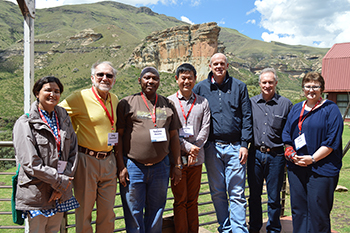Latest News Archive
Please select Category, Year, and then Month to display items
14 June 2024
|
Story Anthony Mthembu
|
Photo Suplied
 Jeremiah Hlahla, a UFS student completing his PhD in Botany at the University of Debrecen as part of an exchange initiative funded by the Erasmus+ Mobility Programme.
Jeremiah Hlahla, a UFS student completing his PhD in Botany at the University of Debrecen as part of an exchange initiative funded by the Erasmus+ Mobility Programme.
As part of an exchange initiative facilitated by the Erasmus+ Mobility Programme, Jeremiah Hlahla, a student at the University of the Free State (UFS), is nearing the completion of his PhD studies at the University of Debrecen in Hungary. Hlahla’s journey, which began in February 2024 and is set to conclude in July 2024, has been a remarkable learning opportunity. “As a first time-traveller to Europe, I have thoroughly enjoyed engaging with people from different countries and cultures,” he said.
The benefits of international collaboration
Hlahla is currently pursuing a PhD in Botany, focusing on plant stress physiology. “My current PhD project investigates the physiological, biochemical and morphological responses of vegetable-type soybean, or edamame, to combined drought and heat stress,’’ he explained. He considers the University of Debrecen the ideal institution to complete his research due to its extensive expertise and resources in similar projects. He noted that his colleagues at Debrecen conduct significant work on plant protection against biotic and abiotic stresses, including salt and drought stress, as well as proteins and amino acids in barley and other legumes.
Given the vast knowledge available on similar projects, Hlahla has found substantial engagement with his work at the University of Debrecen. “Upon arrival, I delivered an introductory lecture presenting my UFS project on the synergistic effects of combined drought and heat stress on the physiology and biochemistry of edamame. It was an engaging session as everyone could relate to my work and asked many questions,’’ he said.
Insights gained from the exchange
Hlahla has also gained valuable lessons that will assist him in his research career, including biotechnology and physiology tools. “I learned how to prepare samples and use high-performance liquid chromatography (HPLC) and reversed-phase ultra-high-performance liquid chromatography (UHPLC) to quantify proteins and amino acids,’’ he said. These techniques are beneficial not only for his current work but will also support future soybean research.
As his experience at the University of Debrecen nears its end, Hlahla reflects on the collaborations and friendships he has formed, which stand out as a significant highlight.
Young researchers shine during the international Afromontane Colloquium
2017-07-18

From the left, are: Drs Reetu Sogani (India),
Greg Greenwood (US-Switzerland), Teboho Manchu,
Acting Campus Principal, Drs Jianchu Xu (China),
Henri Rueff (Switzerland), Glen Taylor, Senior Director:
Research Development; and Dr Elsa Crause,
Campus Vice-Principal: Academic and Research.
Photo: Thabo Kessah
The University of the Free State’s Afromontane Research Unit (ARU), which is situated on the Qwaqwa Campus, has the potential to produce some of the world’s best and dynamic young researchers. This is the view shared by Drs Henri Rueff and Reetu Sogani, who were the keynote speakers during the ARU Colloquium hosted at Golden Gate in the Eastern Free State.
Dr Rueff, a geographer and environmental economist from the Universities of Basel and Bern in Switzerland, was referring to no less than ten Qwaqwa Campus postgraduate students who made oral and poster presentations during the inaugural international colloquium.
Colloquium an opportunity to interact
“You have some of the world’s most motivated and highly skilled students who have the courage to stand in front of extremely critical scientists from all over the globe – and that must be commended,” he said.
Dr Reetu Sogani from India said that her first trip to South Africa did not disappoint. “This colloquium was a very good learning experience for me as I had the opportunity to interact with brilliant and young scientists from this part of the world,” she added.
In closing the colloquium, the Senior Director: Research Development, Dr Glen Taylor, committed the UFS to the success of the unit.
“The ARU will strengthen the research output of the campus. But most important of all, it is setting the research agenda for the Qwaqwa Campus, and for the institution at large, to address the challenges that the surrounding mountain communities are faced with,” he said.